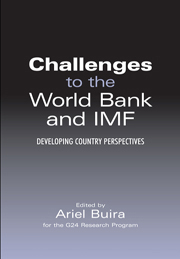Book contents
- Frontmatter
- Contents
- Contributors to this volume
- Foreword
- Introduction
- 1 The Governance of the IMF in a Global Economy
- 2 Who pays for the IMF?
- 3 An Analysis of IMF Conditionality
- 4 Achieving Long-Term Debt Sustainability in Heavily Indebted Poor Countries (HIPCs)
- 5 The Poverty Reduction Strategy Paper Approach: Good Marketing or Good Policy?
- 6 Capital Management Techniques in Developing Countries
- 7 International Reserves to Short-Term External Debt as an Indicator of External Vulnerability: The Experience of Mexico and Other Emerging Economies
- 8 Mechanisms for Dialogue and Debt-Crisis Workout that Can Strengthen Sovereign Lending to Developing Countries
- 9 Developing a Global Partnership for Development
- 10 International Financial Institutions and International Public Goods: Operational Implications for the World Bank
- Index
9 - Developing a Global Partnership for Development
- Frontmatter
- Contents
- Contributors to this volume
- Foreword
- Introduction
- 1 The Governance of the IMF in a Global Economy
- 2 Who pays for the IMF?
- 3 An Analysis of IMF Conditionality
- 4 Achieving Long-Term Debt Sustainability in Heavily Indebted Poor Countries (HIPCs)
- 5 The Poverty Reduction Strategy Paper Approach: Good Marketing or Good Policy?
- 6 Capital Management Techniques in Developing Countries
- 7 International Reserves to Short-Term External Debt as an Indicator of External Vulnerability: The Experience of Mexico and Other Emerging Economies
- 8 Mechanisms for Dialogue and Debt-Crisis Workout that Can Strengthen Sovereign Lending to Developing Countries
- 9 Developing a Global Partnership for Development
- 10 International Financial Institutions and International Public Goods: Operational Implications for the World Bank
- Index
Summary
Abstract
I present a critical examination of Goal 8 of the Millennium Development Goals (MDG), namely, to ‘develop a global partnership for development’. As of November 2002, seven targets were listed under this Goal, as well as seventeen indicators. Given the wide-ranging issues covered under Goal 8, I review only some aspects of the global economic system, their effects on development and what needs to be done to reach Goal 8. The main focus is on the international trade system and the implications of the rules of the World Trade Organization (WTO). I also offer some suggestions on clarifying or adding to the targets and indicators. A key argument of this review is that success in attaining ‘global partnership for development’ underpins or, at a minimum, is linked with efforts in reaching the other seven MDGs, and thus Goal 8 should be given a high priority and efforts to attain it should focus on getting international economic structures, policies and rules right.
Introduction
The origins of the Millennium Development Goals (MDGs) lie in the United Nations Millennium Declaration, which was adopted by all 189 UN Member States on 8 September 2000. The Declaration embodies many commitments for improving the lot of humanity in the new century. Subsequently, the UN Secretariat drew up a list of eight MDGs, each accompanied by specific targets and indicators. This paper addresses Goal 8, which is to ‘develop a global partnership for development’.
- Type
- Chapter
- Information
- Challenges to the World Bank and IMFDeveloping Country Perspectives, pp. 227 - 250Publisher: Anthem PressPrint publication year: 2003
- 1
- Cited by

